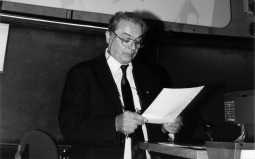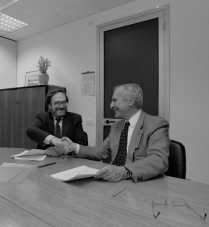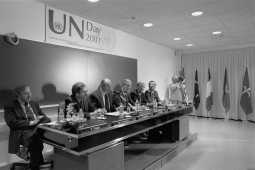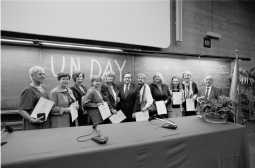Personal tools
News from ICTP 99 - Dateline

Stefano Fantoni, professor of theory of nuclear interactions
at SISSA (International School for Advanced Studies) and an ICTP
consultant, has been awarded UNESCO's 2001 Kalinga Prize for the
popularisation of science. The award ceremony took place on 19
October at UNESCO's headquarters in Paris. Since 1993 Fantoni
has been director of SISSA's Master in Science Communication programme,
a biennial course that brings together some 30 students from Italy
to learn about science communication. Fabio Pagan, an Italian
science writer who is a staff member of the ICTP Public Information
Office, is one of the course's primary organisers. The Kalinga
Prize, the world's most prestigious prize in science communication,
was created in 1952. The 'hall of fame' list of prize winners
includes Bertrand Russell, George Gamow, Arthur C. Clarke, Fred
Hoyle, Konrad Lorenz, and Margaret Mead.

Erio Tosatti, professor of physics at the International School for Advanced Studies (SISSA) and long-time ICTP consultant in the condensed matter physics group, has been elected a fellow of the American Physical Society. Tosatti is being recognised for "his seminal contributions to the theory of solids" and his efforts in "fostering international ties via worldwide collaborations and the organisation of conferences."

As a result of an agreement recently signed by ICTP director Miguel Virasoro and Carlo Rizzuto, chairman of Sincrotrone Trieste, scientists from the developing world will have access to a new beamline at the Elettra synchrotron light source, located in Trieste's Area Science Park. The beamline, called XAFS (an acronym for X-Ray Absorption Fine Structure), can analyse the structure of new materials. ICTP will invest US$1.5 million for the beamline, which is expected to be ready by the middle of this year. About 60 developing world researchers will be able to use XAFS as well as other Elettra beamlines for a total of 1500 hours per year.
SciDev.Net, the first global web site dedicated to both
reporting on and discussing the role of science and technology
in meeting the needs of the developing world, was launched in
December in London. The project, which is receiving editorial
support from the world's two leading scientific journals, Nature
and Science, has been undertaken with the cooperation of
the Third World Academy of Sciences (TWAS). Funding for the project
comes from the UK Department for International Development, the
Swedish International Development Cooperation Agency and the International
Development Research Centre in Canada. To learn more about SciDev.Net
and/or to register to receive regular e-mail alerts providing
information on new material added to the site each week, visit
www.scidev.net
or contact twas@ictp.trieste.it.
Filippo Giorgi, head of ICTP's Physics of Weather and Climate Group, was quoted extensively in a Science news article (26 October, p. 765) focussing on the UN-sponsored report, Climate Change 2001: The Scientific Basis (Cambridge University Press), for which Giorgi served as one of the co-ordinating authors. In the same issue, Science examined efforts by scientists from Islamic nations to strengthen ties with the West in the aftermath of the 11 September terrorist attacks in New York and Washington, D.C. The feature article begins with observations and comments by Farouk El-Baz, the Egyptian-born director of Boston University's Center for Remote Sensing, who served as a member of the Centre's Scientific Council from 1986 to 1993. A lengthy article on Islamic science published in The New York Times on 30 October cites both El-Baz and the late Abdus Salam, the founding and long-time director of ICTP. Mohamed Hassan, executive director of the Third World Academy of Sciences (TWAS), based in Trieste, was quoted in a special feature article on technology and development published in the 10 November issue of The Economist.
The ICTP Prize Selection Committee has announced that the 2001 ICTP Prize in honour of Hans Bethe in the field of high energy physics has been awarded to Soo-Jong Rey, a researcher at Seoul National University Centre for Theoretical Physics in Korea. Soo-Jong Rey has authored more than 90 articles in the fields of string theory, cosmology and particle physics. In the early 1990s, his work on the non-perturbative aspects of string theory set the stage for the discovery of various dualities in string theory later that decade.

ICTP celebrated UN Day for the first time on 23 October 2001. The celebration took place in the Kastler Room of the Adriatico Guesthouse with some 200 people in attendance. Among those who gave brief presentations were Miguel Virasoro, ICTP director; Roberto Dipiazza, mayor of Trieste; Arturo Falaschi, director, International Centre for Genetic Engineering and Biotechnology (ICGEB); Stanislav Miertus, deputy director, International Centre for Science and High Technology (ICS); and Khavtgain Namsrai, physics professor at the University of Ulaanbaatar, Mongolia, who represented the Third World Academy of Sciences (TWAS). There was also a recorded video message from UN Secretary General, Kofi Annan, winner of the Nobel Peace Prize for 2001, an honour that he shared with UN staff worldwide. In his talk, Virasoro reaffirmed the Centre's role as a meeting place for diverse cultures, a role that has assumed even greater significance in light of the terrorist attacks of 11 September and the subsequent war in Afghanistan. The following day, 24 October, ICTP honoured Centre employees who have worked for the UN for 20 years or more. Among the honourees was Mariuccia Fasanella, ICTP's head librarian, who has been with the Centre for 36 years.
